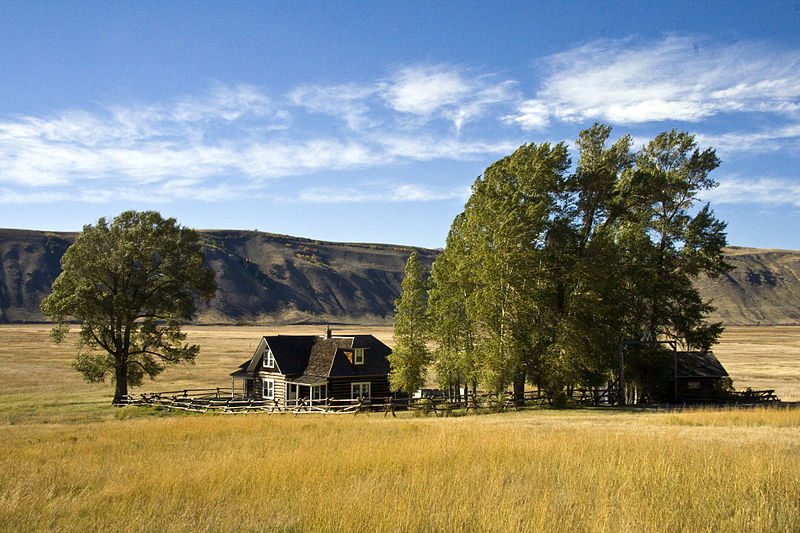The casket was sky blue with shiny new chrome.
Her house had been painted blue, back when she was well enough to live it in on her own. Oh. There were things she couldn’t do anymore, not like she used to do. She couldn’t keep up with the watering in the summers. The dry land areas of Oregon can get quite hot and dusty in July and August. She kept her beloved hydrangea bush watered good but in the other flower beds she asked the girls to plant artificial flowers in them, please.
They thought it odd, digging in the dirt that a’way, to stick plastic irises in the ground. Why not just let the grass fill in the flower beds? But they didn’t question the elderly lady. They had too much respect for her for that.
They were young girls when they first met her, while helping their brother out on his paper route before finally taking it over from him. The girls stayed in touch with her over the years, even after she was moved off to that nursing home. She had always wanted daughters but only had sons. That’s what she told the girls when they would visit her on Saturday mornings. One girl would mop the kitchen floor. The other would vacuum the carpets. One would polish the silver, the other would polish the furniture. And all the while they would hear the stories of a family they did not know and, save for a few, ever did meet.
I interviewed her once about life as it had been, back when her husband owned the local drug store. What I recall best was how she despised the big Mart stores. It is hard for the elderly to get around those big stores, she said. The concrete floor is hard on the hips and people with health problems can’t walk that far just to pick up a few items. I have thought of that many times as I’ve wandered the aisles myself looking for just a handful of things.
Yesterday the preacher, who didn’t know her at all, recounted how she liked everything to be matchy-matchy. How she would carry a swath of fabric around in her purse for months, sometimes years, looking for the exact matching color. I looked over at my daughter and laughed. She was wearing a bracelet, earrings, and a brooch all made of the same green stone. Fake emeralds. A gift from the woman whose body was inside that blue casket.
My daughter smiled through her tears. She has a tender heart this daughter of mine. She is a girl given to passion. When she loves she loves with her whole heart. Nothing held back in reserve.
The last time they visited, the lady of the artifical flowers did not remember my daughter’s name. And although my daughter told it to her, the lady couldn’t quite place her.
“She didn’t know me but she knew she loved me.”
That’s what my daughter said.
“She didn’t know me but she knew she loved me.”
I asked how she knew that? Did the lady say something?
“No. I just knew it. I could see it in her face.”
Our faces often say more than our lips reveal. That’s why writers like me are always studying people, looking for the raised eyebrow, the sly grin, the jaw clenched, the furrowed brow.
But I had completely missed that moment right before the preacher gathered us around the blue casket. I was looking off over yonder at the way the sunlight filtered through the trees, thinking back to that season not so long ago when I stood near this same place as friends buried their 16-year-old son, killed in a farming accident.
My daughter saw the whole thing, though. The furrow in the woman’s brow as her ex-husband came walking up the asphalt. He was the last to arrive.
The woman stated to all within earshot that it was so inappropriate. My daughter was confused. She thought maybe the ex-wife was talking about how the man had parked his car on a different hillside. Or maybe, what? Was she bothered by the blue-tooth earpiece in his ear?
I was watching him at this point. Not her. He has always been a good-looking fellow. Age and gravity had not pulled him closer to the middle of things, the way it had her. He stood straighter than in years past. Free now, I’ve heard, from the addictions and destructive way of living that had once troubled him.
He was hanging back, trying not to be intrusive, just wanting to be there, to pay his respects to the lady in the blue coffin, the one, he said later, who had loved him like family and helped him through the hard time of his life. Their daughter would never have known her grandmother if not for him, he added.
That part was true. Many times when the girls were there he would bring his young daughter by for a visit with her grandmother. That young daughter is older now, high school age. She had started toward her father when her mother stopped her and told her “You came with me.”
Then, in a fit of sheer ugliness, the woman shouted out before God and everybody at the father of her daughter: So inappropriate. You are not welcome here.
She was family feuding at the grave site.
Sometimes you can see more than the look of love in a person’s face. Sometimes bitterness spills like acid, transforming a creature of beauty into a grotesque gargoyle.
His shoulder slumped forward, his chin quivered. Hesitation shadowed him.
She herded their daughter and her other children to the far end of the casket, a good spot to listen to the preacher talk about the faithfulness of God.
He hung back, far behind anyone else. But it was a small crowd, not much larger than a dinner party group. His presence was acutely noted by everyone there. His distance less a show of respect than one of rejection.
My daughter wept.
She knew the lady in the blue casket would not want this. Not here. Not today. Not at her grande finale. She looked at me and I saw in her face what she didn’t say — What should we do, Mama?
I walked over and took my place right next to him. He recognized my daughter first. “I remember you,” he said, offering his hand in greeting. His chin quivered still. His voice cracked with emotion. I offered him my hand and my name. Oh. Sure, he said, recounting something I had written recently. We stood there together, the three of us, apart from the rest.
It was a brief ceremony. The briefest of ceremonies. The cassette recording of Amazing Grace playing on the Boom Box got stuck. An attendant from the funeral home slapped it once and it restarted, only to get stuck again.
Oh. Well. You know the rest of the song, right, the preacher tried to make light of someone’s shoddy work ethic. My daughter sang the song to herself and cried.
When you are 98 and can’t remember the names of the people you know you love, people sigh of deep relief when you die. There’s a smugness among the living that the dying don’t possess.
Flowers aren’t the only artificial things we find ourselves tending.












